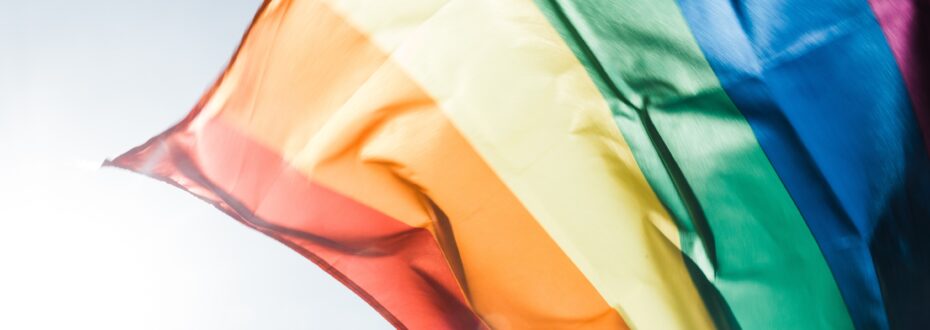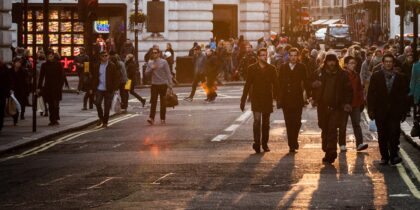Today, in Central London, streets will be cleared, rainbow flags will be unfurled, lorries and buses will be turned into makeshift carnival floats. Friends will meet early for celebratory breakfasts in Soho. We will variously wear badges, t shirts with slogans and, on occasion, wigs and high heels. We will smear glitter on our faces, beat drums, and wave banners. There will be dancing and laughing, singing and whooping. We will bump into friends we haven’t seen in ages and others we didn’t expect to see. As the march stretches out into the distance, we will feel like we belong, connected to each other, strong.
This is London LGBT Pride. And on this day, in this place, there is no need for us to hide. We can enjoy the privileges that others take for granted: hold hands with our partners, walk proud with our children, participate without excuse or explanation. There will be thousands of on-lookers too: babies in buggies, tourists and scaffolders, waving policeman, newscasters and stewards. Yes, Pride is about inclusion. It’s an LGBT party and everyone is invited.
We can enjoy the privileges that others take for granted: hold hands with our partners, walk proud with our children, participate without excuse or explanation.
2019 marks 50 years since the Stonewall Riots. In a climate of civil rights struggle and anti-war protest, amidst widespread prejudice and discrimination, and without warning, the New York Police Department yet again raided the Stonewall Bar on Christopher Street. The customers – and local residents – could take no more. They fought back. And in the following weeks, protestors came together to find safe places, a shared purpose, collective voices – a new kind of community.
In the fifty years that followed, LGBT people across the world have fought for their rights. In the UK, our victories have been hard won, yet significant: an equal age of consent; equality in marriage; an end to discrimination in schools; freedom to join the armed forces; pension rights. For many LGBT people, but not by any means all, life is better than it was 50 years ago. And our mental health has improved as a result.
In the UK, our victories have been hard won, yet significant… and our mental health has improved as a result.
But discrimination and inequality persist. For many – especially those who do not live in cities with a strong LGBT presence like London, Manchester or Brighton – finding friendly people and safe places to socialise and work is still challenging. Shockingly, LGBT people are more likely than any other minority to experience hate crime. Trans people routinely face blatant discrimination, including in their interactions with statutory services. Young LGBT people are more likely to experience poorer mental health than their heterosexual and cis gendered peers – they are up to 4 times more likely to self harm or attempt suicide, for example – and their rights to assert their identities in schools are threatened once again.
When we remember those history-defining moments in New York fifty years ago, we must not forget those LGBT people who have survived the subsequent 5 decades, who lived through the partial decriminalisation of homosexuality in the UK, through the Stonewall Riots, and Gay Liberation. They are the ones who lost friends and lovers in the AIDS epidemic. They are the ones who stood outside Parliament and shouted whilst debates about equality were going on inside. They staged kiss-ins and die-ins and took good care of each other. They marched, marched again, and then marched some more. They took the risks that secured the changes we all now enjoy. Yet despite their resilience and experience, they face a host of potentially debilitating challenges. Loneliness and social isolation – on occasion compounded by poverty – are common and are often associated with anxiety and depression, as well as unhealthy behaviours like gambling or drinking to excess.
The LGBT community stands on the shoulders of its older members. They broke new ground for us, often at significant personal cost.
Older LGBT people often live alone, cut off from friends, or in places where the scene is dominated by young people, and they do not feel welcome. Towards the end of their lives, older LGBT people might be forced back into the closet. They might live in neighbourhoods where they feel unsafe or in care homes where their identities go unnoticed and their lovers go unmentioned. They might be looked after by home carers who never inquire about their pasts. Dementia might blur their memories and because nobody has taken the time to find out, despite years of being proud, their identities might be at erased. Today is a day for celebration and for looking to the future – to the next fifty years, and beyond. It is a day to be proud, for sure. The LGBT community stands on the shoulders of its older members. They broke new ground for us, often at significant personal cost. Their visibility depends, in part, on how much the rest of society engages with, and includes, them. As such, we must stand alongside them in their fight for good mental health and wellbeing – today, tomorrow, every day.




